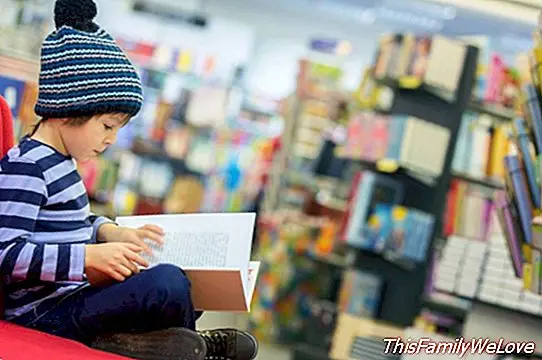Library evenings: a plan to inculcate reading to children

There is something magical about libraries, and of that natural magic felt by the youngest ones, it is easy to bear fruit, not only the love of reading, but the good habit of spending many evenings of your life in that environment. And there is only one way to instill a taste for libraries: go to libraries. In the hand of the parents is to make this plan a habit and custom a habit that will possibly remain for life.
The best time to start the children in the visits to the library It's early childhood, even when they do not read yet. Children are especially attracted to the number of books they have at their disposal. Since at the beginning they can only look at drawings, they will especially like to have access to many volumes because they will soon run out.
Then, as soon as they begin to gather letters with a certain ease, they will complete the great discovery of reading. Most of the centers have adequate and soundproof spaces for the little ones so that, although they have to keep quiet, we do not have to be constantly worried about bothering adults.
Ideas for frequenting libraries with children
But it will be this need to respect the rules of adults one of the key points to develop the illusion of children: they are treated as adults and they are expected to behave as adults. In fact, in many municipalities children can have their own children's library card. Emulating their parents and being "holders" of a card with their first and last name will make them grow in self-esteem.
Taking advantage of this circumstance, you can use the scope of the library to develop your responsibility. Since the book that can be borrowed home is "in your name", they will have to remember the delivery date, manage the reading times and even learn to manage calendars and schedules to take note of the deadlines.
Choosing what books you want to take home will serve to develop your critical capacity. The criterion is learned as it is put to use. That is why it is important to let them "navigate" the shelves without too many constraints when it is not about looking for something concrete. They will make a first selection of several volumes and then they will have to learn to choose and discard. Sometimes, we will see that they are making a mistake with the chosen book, but it is also part of their learning. And, little by little, they alone will define their own tastes and interests.
Benefits of libraries in early childhood education
The library environment will help them improve their ability to concentrate. It is very good not to go alone to take out books, but to spend a little time there from time to time. If the children already have homework, they can do it there on the chosen evening and then dedicate themselves to reading. In this way, without practically effort, they will acquire the discipline of silence and learn to spend long times in their chairs. These habits will be fundamental when they grow because they will provide them with more techniques to study.
In fact, as they progress in their studies, the idea of passing some afternoons in the library will serve them to improve their academic performance. It is an environment free of distractions that especially invites concentration. If parents take advantage of those times to read or work with them, we will also mark the necessary rest rhythms and eventually internalize them.
When they are no longer old enough for us to accompany them, they will have made their use of the library as natural as their home. It is a good measure, not only for the benefits in terms of discipline, but also because it provides them with an adequate space for study that they may not find at home.
For adolescents and young people, the library is also an environment in which to combine their academic obligations with the interaction with friends. In addition, it is an adequate space for socialization with peers since the atmosphere generated during breaks is conducive to conversation and, in addition, they learn the responsibility of people of their age, so they do not consider it an imposition.
Victoria Molina




